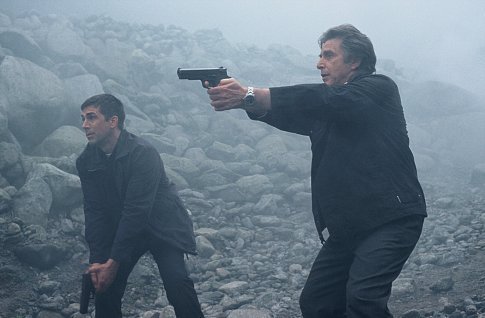Insomnia (2002)

Insomnia (2002), directed by Christopher Nolan, is a gripping psychological thriller that delves into themes of guilt, morality, and the blurred lines between justice and corruption. A remake of the 1997 Norwegian film of the same name, Nolan’s version is set against the hauntingly atmospheric backdrop of an Alaskan town where the sun never sets during the summer months. This perpetual daylight plays a central role in amplifying the psychological tension faced by its characters. Featuring powerful performances from Al Pacino, Robin Williams, and Hilary Swank, Insomnia showcases Nolan’s talent for crafting intense, character-driven narratives.
The story follows seasoned Los Angeles detective Will Dormer (Al Pacino), who is sent to the remote town of Nightmute, Alaska, with his partner, Hap Eckhart (Martin Donovan), to investigate the murder of a teenage girl named Kay Connell. Dormer is already under pressure due to an internal affairs investigation back in Los Angeles that threatens to expose unethical actions he took in the past to secure convictions. This tension is further heightened when his partner Hap hints that he might testify against him.
Dormer’s journey takes a dark turn during a foggy stakeout to capture the suspected killer. In the chaos, Dormer accidentally shoots and kills Hap. Uncertain if it was truly an accident or subconsciously intentional due to Hap’s betrayal, Dormer decides to cover up his role in the shooting, claiming that the fugitive murdered his partner. As Dormer wrestles with his guilt, exhaustion, and increasing paranoia, his sleeplessness worsens under Alaska’s relentless daylight, driving him to the brink of madness.
Pacino delivers a tour-de-force performance as Will Dormer, portraying a man unraveling under the weight of his own conscience. His gaunt, sleep-deprived appearance and haunted eyes vividly convey Dormer’s spiraling mental state. Pacino masterfully captures the complexities of a character who is both deeply flawed and deeply human, torn between his desire for redemption and his instinct for self-preservation.
Robin Williams, known primarily for his comedic roles, gives a chilling and understated performance as Walter Finch, the primary suspect in Kay Connell’s murder. Finch is a reclusive crime writer who contacts Dormer after the shooting, revealing that he witnessed the killing and offers to keep Dormer’s secret in exchange for leniency. Williams’s portrayal is unnervingly calm and calculated, making Finch a compelling foil to Dormer. Their tense cat-and-mouse exchanges blur the lines between hero and villain, as Finch uses Dormer’s guilt against him, creating a psychological battle that drives the film’s tension.
Hilary Swank plays Ellie Burr, a young, idealistic local detective assigned to assist Dormer. Burr admires Dormer’s reputation but gradually becomes suspicious as inconsistencies in his story come to light. Swank brings depth and earnestness to the role, serving as a moral compass who contrasts sharply with Dormer’s compromised ethics. Her character’s gradual realization of the truth adds another layer of suspense, as viewers wonder whether Dormer will ultimately confess or continue down a path of deception.
Christopher Nolan’s direction emphasizes atmosphere and psychological tension over traditional action. The Alaskan setting, with its endless daylight, creates an oppressive sense of disorientation and fatigue that mirrors Dormer’s unraveling psyche. Nolan uses this unique setting not just as a backdrop but as a psychological tool, enhancing the film’s themes of sleeplessness, guilt, and moral ambiguity. Wally Pfister’s cinematography captures the stark beauty of the Alaskan wilderness, juxtaposed with the claustrophobic intensity of Dormer’s internal conflict.
The film’s pacing is deliberate, building tension through character interactions and moral dilemmas rather than high-octane chases or violence. Nolan explores the moral gray areas of justice, asking whether the ends justify the means and how far one can go before becoming indistinguishable from the criminals they pursue. As Dormer grapples with his conscience, he faces choices that test his integrity and the very principles he once stood for.
In Insomnia, there is no clear line between right and wrong. Both Dormer and Finch are flawed, morally compromised individuals, yet their motivations and actions highlight the complexities of human nature. Nolan’s deft handling of this moral ambiguity, combined with the film’s haunting visuals and compelling performances, make it a standout entry in the crime-thriller genre.
Ultimately, Insomnia is a tale of redemption and reckoning, a study of guilt’s corrosive power and the price of compromise. Through its complex characters and moral dilemmas, the film offers a thought-provoking exploration of justice, conscience, and the consequences of our choices. It remains a compelling example of Christopher Nolan’s skill as a director, blending psychological depth with gripping storytelling to create a memorable and atmospheric thriller.











